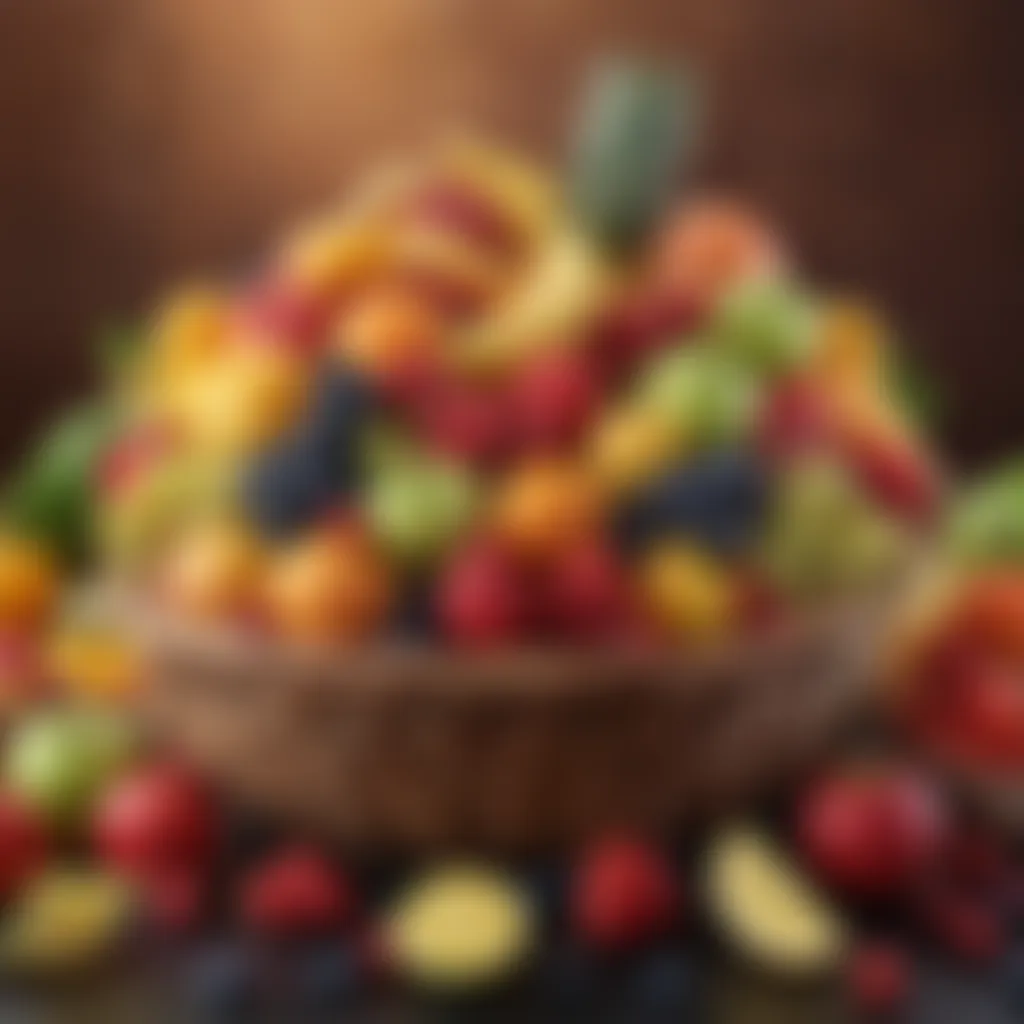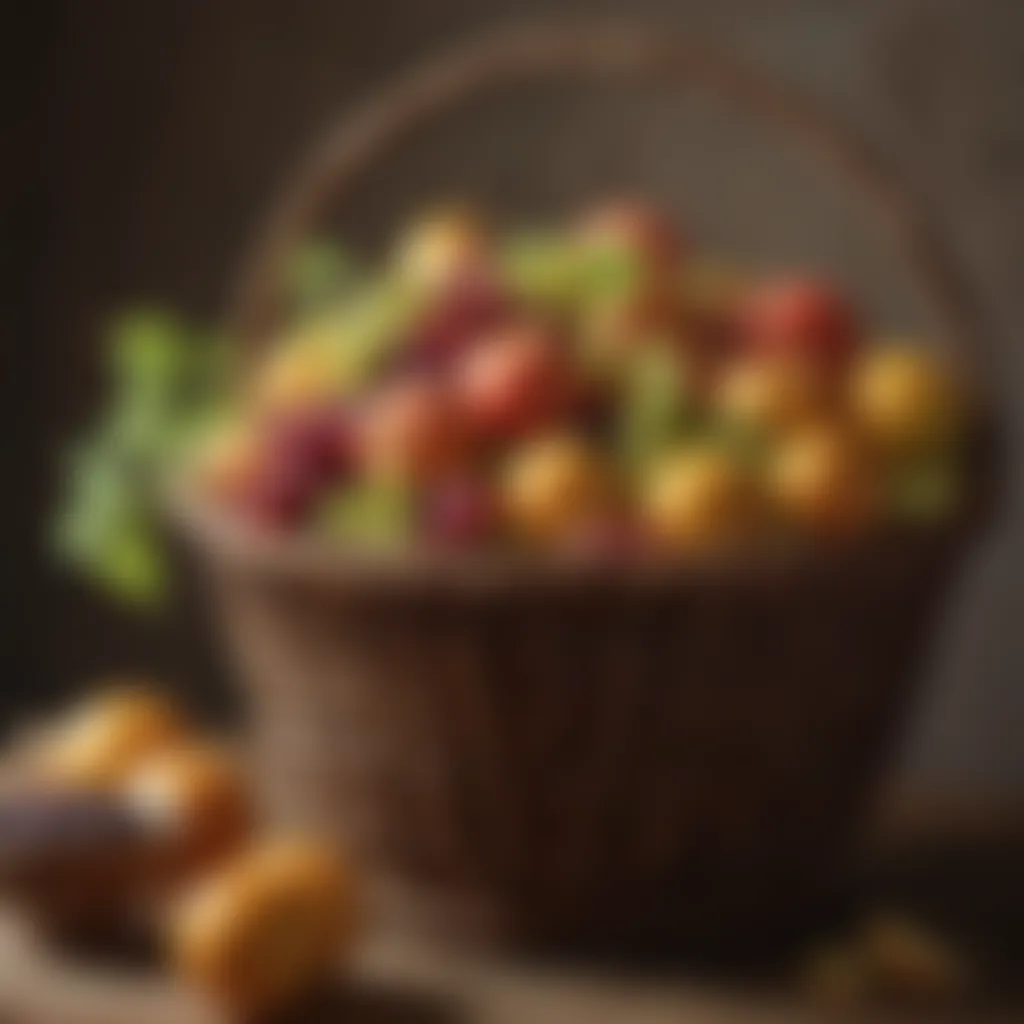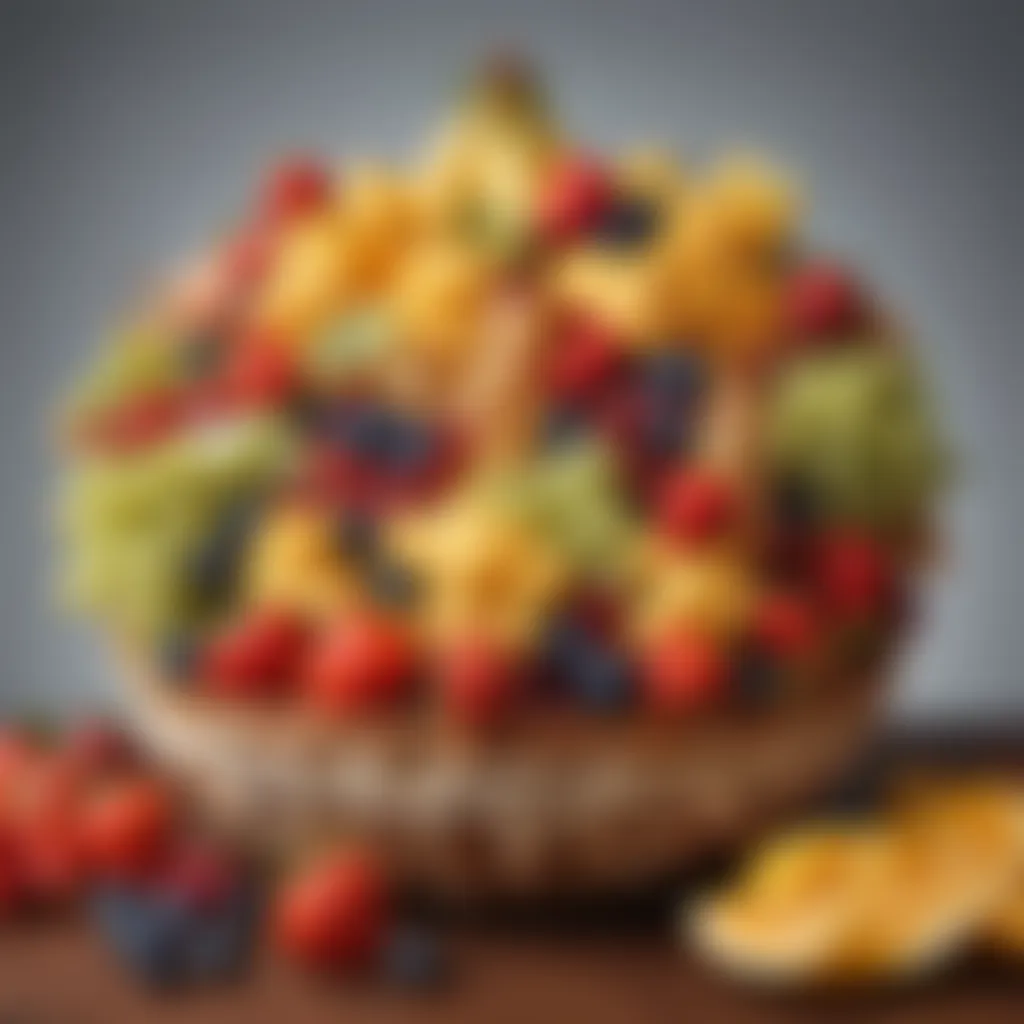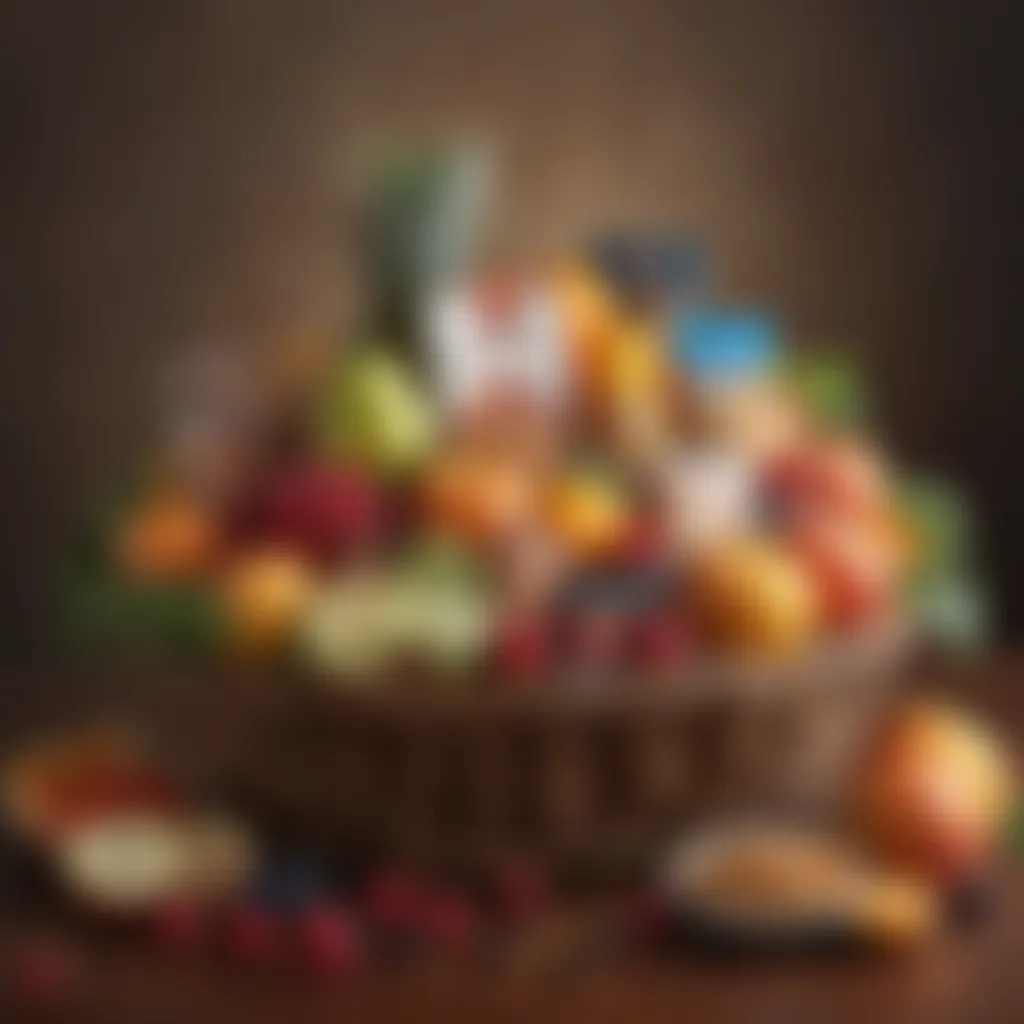The Art and Benefits of Fruit and Snack Baskets


Intro
Fruit and snack baskets represent a confluence of culinary creativity and nutritional awareness. They serve not only as a means of nourishment but also as a canvas for artistic presentation and thoughtful gifting. Bringing together various elements, these baskets can reflect individual tastes, cultural heritage, and dietary needs. This exploration seeks to shed light on the intricacies of fruit and snack baskets, from their historical roots to their contemporary applications in daily life.
The significance of these baskets transcends mere sustenance. They play a vital role in promoting health, fostering social interactions, and enhancing the aesthetics of gatherings. Understanding how to create and utilize fruit and snack baskets effectively can enrich personal and communal experiences. This guide aims to provide a comprehensive narrative surrounding this concept, focusing on practical tips and cultural insights.
Ingredients:
To create an appealing and nutritious fruit and snack basket, the selection of ingredients is crucial. Here is a guide to the necessary items:
- Fruits:
- Snacks:
- Extras:
- Apples: 2 medium-sized
- Bananas: 3 ripe
- Grapes: 1 pound, assorted colors
- Oranges: 3 medium-sized
- Pineapple: 1, peeled and cubed
- Mixed nuts: 1 cup (almonds, walnuts, cashews)
- Dried fruit: 1 cup (raisins, apricots)
- Dark chocolate pieces: 1 cup
- Cheese cubes: 1 cup (cheddar, gouda)
- Decorative elements: Fresh mint leaves
- Basket/container: 1 medium wicker basket
This selection ensures a colorful, diverse, and satisfying assortment of flavors, textures, and nutrients. The freshness of fruits paired with the crunch of snacks creates an appealing balance for any gathering.
Preparation Steps:
Step 1: Wash the Fruit
Thoroughly rinse all fresh fruit under running water. Use a brush for firmer fruits like apples and grapes to remove any residues. Dry them with a clean cloth.
Step 2: Cut and Arrange
- Pineapple: Peel and slice into bite-sized pieces.
- Oranges: Segment and remove any seeds.
- Bananas: Slice into rounds.
Step 3: Assemble the Basket
Place the fruits and snacks in the basket. Start with the larger pieces of fruit at the base and layer the smaller items on top. Use cheese cubes and nuts to fill gaps for a more attractive presentation.
Technical Aspects:
Temperature Settings
No particular temperature is required for assembling a fruit and snack basket. However, if you choose to store items ahead of time, keeping them in the refrigerator is advisable. Chilled fruits enhance flavor and texture.
Timing Specifics
Preparation should take roughly 30 to 45 minutes. This provides ample time to wash, cut, and arrange each component thoughtfully.
Cooking Process:
Sequential Steps:
- Prepare the work area by ensuring cleanliness.
- Wash and dry all fruits thoroughly.
- Slice the fruits appropriately and sort snacks.
- Utilize the base of the basket for larger fruits.
- Fill in with snacks, focusing on variety and color.
- Add decorative elements like mint for a fresh touch.
Troubleshooting Tips:
- Fruit Browning: Use lemon juice on cut apples and bananas to prevent oxidation.
- Overcrowding: Ensure not to overcrowd the basket, as it can lead to squished fruit. Space out items thoughtfully.
- Lack of Variety: Be mindful of including a range of textures and flavors for a well-rounded experience.
Creating fruit and snack baskets can be a fulfilling endeavor. This guide ensures that you have the knowledge to craft these arrangements skillfully, enhancing both taste and presentation.


Foreword to Fruit and Snack Baskets
Fruit and snack baskets hold a unique place in culinary practices and social gatherings. They are more than just a collection of items; they symbolize thoughtfulness, care, and a balanced diet. This article dives deep into the various aspects of fruit and snack baskets, highlighting their importance in both personal and communal settings.
Defining Fruit and Snack Baskets
To understand fruit and snack baskets, they can be seen as curated assortments that combine fresh fruits and snack items. These baskets often serve a variety of purposes, from conveying goodwill as gifts to enhancing the aesthetic of a social gathering.
Fruits are the centerpiece of these baskets. Common selections include apples, bananas, oranges, and berries. These are not only popular for their flavors but also for their nutritional benefits. Snacks, on the other hand, can range from nuts to granola bars, offering different tastes and textures. The combination of fruits and snacks creates an appealing and healthy offering.
Historical Context
Historically, the concept of basket gathering can be traced back to ancient civilizations. Basket making itself was a necessary skill in many cultures, used for storing food and goods. The inclusion of fruits or snacks in baskets developed over time as societies began to understand the health benefits of a diverse diet.
In many cultures, presenting a basket as a gift signifies generosity. For example, during harvest festivals, fruit baskets were exchanged as tokens of appreciation and goodwill. Over centuries, these traditions have evolved, incorporating various types of snacks and fruits depending on regional availability and cultural significance. Today, fruit and snack baskets are not only a dietary choice but also an expression of hospitality.
Nutritional Benefits
Understanding the nutritional benefits of fruit and snack baskets is essential for several reasons. First, these baskets provide a user-friendly way to include a variety of healthful options in one's diet. A balance of fruits and well-chosen snacks can significantly contribute to overall well-being. Recognizing the vital components within can help families make smarter choices.
Essential Nutrients in Fruits
Fruits are rich in essential nutrients that the body needs to function properly. They offer vitamins and minerals that contribute to health in diverse ways. For instance, fruits like oranges and strawberries are high in vitamin C, which supports the immune system. Bananas provide potassium, crucial for maintaining muscle function and fluid balance.
Moreover, the dietary fiber found in fruits aids in digestion and can help manage weight by promoting a feeling of fullness. Fiber also plays an important role in lowering cholesterol levels and reducing the risk of heart disease. As such, incorporating a colorful mix of fruits can not only enhance flavor but also optimize nutrient intake.
"A variety of colors in your fruit basket often indicates a variety of nutrients. Different colors represent different health benefits."
Importance of Snacks in Daily Diet
Snacks are often misunderstood. However, when chosen wisely, they can fill nutritional gaps between meals and provide necessary energy. Healthy snacks can sustain energy levels throughout the day and prevent overeating during main meals. For example, nuts or yogurt can serve as protein-rich snacks, supporting muscle recovery and keeping you satiated.
Additionally, incorporating fruits as snacks not only satisfies cravings but also delivers important vitamins and hydration. An apple or a handful of grapes can be a refreshing choice, offering natural sugars without the added fillers commonly found in processed snacks. This balance of nutrients plays a significant role in enhancing cognitive function and overall health.
To provide clarity, here are several points to consider when choosing snacks for fruit and snack baskets:
- Opt for whole foods over processed options.
- Aim for snacks that offer both complexity and simplicity in flavor.
- Select items that include protein, fiber, or healthy fats.
- Ensure variety to keep choices interesting and appealing for everyone.
By understanding the nutritional benefits of selecting the right combinations in fruit and snack baskets, families can foster healthier eating habits and improve their quality of life.
Cultural Significance
The cultural significance of fruit and snack baskets lies in their ability to bridge social gaps and foster connections among different communities. They act as universal symbols of hospitality and sharing. During festive occasions, gatherings, and even daily interactions, these baskets take on new meanings across various cultures, becoming part of family traditions and community rituals.
Fruit Baskets in Various Cultures
Fruit baskets are deeply rooted in multiple cultures around the globe. In many societies, they represent abundance, prosperity, and health. For instance, in the Mediterranean region, colorful fruit baskets are often a centerpiece during celebrations and family gatherings. They showcase seasonal fruits that symbolize the fertility of the land.
In Asian cultures, fruit baskets also carry significant meanings. For example, in Chinese tradition, fruits like oranges and apples are seen as symbols of luck and peace. These fruits are often included in gifts, especially during the Lunar New Year.
Here are some interesting aspects of fruit baskets in various cultures:
- Symbols of Affection: Gifting a fruit basket can express care and goodwill. It serves as a tangible way to show affection in many societies.
- Rituals and Customs: Different cultures integrate fruit baskets into their rituals. They might be offered at temples, used during weddings, or provided at hospitality events.
- Culinary Traditions: In many cultures, the fruits themselves have historical significance. For example, the use of figs and dates in Mediterranean cuisine is tied to ancient agricultural practices.
Snack Traditions Around the World


Snack traditions highlight how societies incorporate simple foods into their daily lives. Each culture has unique ways of enjoying snacks, often influenced by available resources. In Italy, for example, snacks may consist of bruschetta or olives, while in Japan, rice cakes and seaweed snacks are common.
These snack traditions can also intensify the experience of sharing meals. Social gatherings often feature snacks that promote interaction. Sharing snacks can break down barriers and make the experience more enjoyable.
Key elements of snack traditions around the world include:
- Cultural Heritage: Many traditional snacks carry historical significance, representing the heritage and culinary preferences of a region.
- Celebratory Foods: Snacks often find their way into celebrations, showcasing a community's spirit and creativity. They are not just food; they are part of the celebration.
- Local Ingredients: Snacks usually incorporate local ingredients. This practice supports local economies and keeps culinary traditions alive.
Understanding the cultural significance of fruit and snack baskets helps us appreciate their roles in our communities. They are not merely food items, but representations of shared values, traditions, and connections.
Practical Applications
The section on Practical Applications highlights how fruit and snack baskets serve various purposes beyond mere dietary benefits. Understanding these applications allows individuals to appreciate the versatility of these baskets. They can be customized and utilized in different situations, thereby enhancing the overall experience for both givers and recipients.
Fruit and Snack Baskets for Gifting
Gifting fruit and snack baskets can be a thoughtful gesture in many scenarios. Whether for a birthday, holiday, or as a token of appreciation, these baskets are suitable choices that convey care.
By choosing a variety of fruits and snacks, you can cater to the preferences of the recipient. For example, including apples, grapes, and almonds can provide nutrition along with satisfaction. It is important to consider the seasonality of fruits to ensure freshness. Seasonal fruits not only taste better but also showcase attention to detail.
These baskets can be tailored for dietary restrictions. Some individuals might prefer gluten-free snacks, while others may avoid certain fruits due to allergies. Encouraging this personalization will add to the value of the gift. Furthermore, adding a personal note can enhance the emotional connection.
"Gifting a thoughtfully arranged fruit and snack basket showcases consideration and respect for the recipient's tastes."
Incorporating Baskets in Events and Gatherings
Event planning can benefit greatly from the inclusion of fruit and snack baskets. These baskets can serve as centerpieces or snacks that guests can enjoy during gatherings. The visual appeal of colorful fruits helps elevate the atmosphere of any event, creating an inviting environment.
For formal events, elegant fruit baskets can impress guests. Consider including exotic fruits to create a conversation starter. On the other hand, casual gatherings can opt for snack baskets featuring chips, nuts, and dried fruits, making them easy to pick up and enjoy.
Practical considerations include ensuring that the selection remains diverse and caters to different preferences. Additionally, offering baskets with healthy options promotes well-being among the guests. By being mindful of the selection, hosts can foster an environment that respects the health choices of all attendees.
Child and Family Considerations
The concept of fruit and snack baskets plays a vital role in family dynamics and child development. By engaging young minds and tastes, these baskets can become both educational tools and nutritious options. Understanding how to create these baskets with children and for families helps in making healthier eating choices. It promotes family time while also teaching children the importance of proper nutrition.
Creating Fun and Engaging Baskets for Children
When making a fruit and snack basket for children, the goal is to make it visually appealing and fun for them. Children are often attracted to bright colors and interesting shapes. Including a variety of fruits, such as strawberries, bananas, and grapes, can entice them to try new things. Consider the following tips for creating an engaging basket:
- Mix colors: Use a range of colorful fruits and snacks to draw attention. Children are more likely to try fruits that look appealing.
- Use themes: Create themed baskets based on favorite characters or colors. For instance, a "superhero" theme can include fruits like "Super Strawberry" or "Banana Batman."
- Interactive activities: Incorporate elements like stickers, or fun recipes that children can try with their parents. This can turn fruit eating into a fun activity rather than a chore.
Offering variety can also reduce the chances of fussiness during snack time. When children are involved in choosing items for their baskets, they feel a sense of ownership. This often leads to them being more open to trying different types of fruits and healthier snacks. The involvement can be as simple as letting them pick their favorite fruits during grocery shopping.
Promoting Healthy Snack Choices for Families
In the current era, where processed snacks often dominate the market, fruit and snack baskets stand out as an option for families looking to promote healthy choices. Creating awareness of the benefits of healthy snacking is crucial. Here's how to encourage families to embrace these options:
- Teach about nutrition: Use the baskets as an opportunity to explain the health benefits of each item. For example, explaining how apples can boost energy can make a lasting impact on their diet.- Set a positive example: Families should demonstrate healthy eating habits. When children see their parents enjoying fruits, they are likelier to follow suit.
- Accessibility is key: Keep the fruit and snack basket in a visible area of the kitchen. Having healthy snacks readily available encourages snacking on fruits instead of junk food.
"Parents who actively promote and involve themselves in their children’s eating habits lay the foundation for a lifetime of healthy choices."
By combining nutrition education with engaging elements, families can foster an environment that supports healthy choices. The synergy of these strategies not only equips children with better eating habits but also strengthens family bonds through shared experiences.
Health Trends and Diets


The examination of health trends and diets reveals critical insights into the role of fruit and snack baskets in modern eating habits. As more individuals become health-conscious, the composition of what they consume has shifted towards more nutritious and balanced choices. It's essential to understand how fruit and snack baskets can serve as a beneficial element in achieving these dietary goals.
Fruit and Snack Baskets in Modern Diets
In contemporary diets, fruit and snack baskets play a vital role. They provide a practical way to incorporate a variety of fruits and snacks into daily meals. With an increase in awareness about the benefits of whole foods, these baskets can easily present fresh produce alongside healthy snacks such as nuts, yogurt, and granola.
Consider these points about their significance:
- Convenience: A ready-made basket can simplify meal planning. Families can reach for nutritious options without the need for extensive preparation.
- Variety: Combining different fruits and snacks encourages a broader intake of vitamins and minerals. This diversification supports overall health and well-being.
- Balance: Including snacks that are low in added sugars and high in protein can counterbalance the natural sugars found in fruits, helping to sustain energy levels throughout the day.
Superfoods and Their Integration into Baskets
In the context of health diets, superfoods are often highlighted for their exceptional nutritional profiles. Integrating these into fruit and snack baskets amplifies their health benefits significantly. Superfoods such as quinoa, chia seeds, and various greens can be included to augment both flavor and health value.
Here are some popular superfoods to consider:
- Chia Seeds: Rich in omega-3 fatty acids and fiber, they can be used in smoothies or added to yogurt.
- Quinoa: A versatile grain that can serve as a base for a mixed basket, providing a complete protein source.
- Avocado: Not just a fruit but a nutrient-dense option high in healthy fats, ideal for topping on whole-grain crackers.
Keeping healthy snack choices accessible in fruit and snack baskets can encourage families to choose better options.
By thoughtfully curating the elements in fruit and snack baskets, one can cater not only to taste preferences but also to the renowned health benefits of modern eating trends. This conscious approach aligns perfectly with growing dietary shifts towards more wholesome and nourishing foods.
Sustainability Considerations
Sustainability in fruit and snack baskets emphasizes the need for environmentally responsible practices throughout the whole process. This includes sourcing, packaging, and disposal methods. By focusing on sustainable considerations, we not only support local economies but also minimize environmental impacts. Understanding these factors is important, especially for consumers who wish to make choices that align with their values concerning health and the planet.
Sourcing Local Produce for Baskets
Sourcing local produce plays a central role in creating sustainable fruit and snack baskets. By purchasing fruits and snacks grown in your area, you reduce the carbon footprint associated with transportation. This practice supports local farmers, promoting community health and economic resilience.
When you select local produce, you typically get fresher items. Local fruits frequently require less packaging and preservatives, ensuring they are wholesome and appealing. Also, local sourcing allows consumers to cultivate relationships with growers, enhancing transparency concerning food origins.
Consider these potential benefits of sourcing local produce:
- Reduced Transportation Emissions: Less travel means a smaller environmental impact.
- Support for Local Economies: Money spent locally helps sustain farmers and local businesses.
- Seasonal and Fresh Options: Local sourcing provides seasons’ best produce.
By incorporating local fruits and snacks into your baskets, you effectively create healthier choices and contribute to ecological well-being.
Packaging and Environmental Impact
Packaging is another critical factor in sustainability. Traditional packaging materials, such as plastic, pose significant environmental challenges. They can take decades to break down and often end up in landfills or oceans, harming wildlife and ecosystems.
To mitigate this impact, consider these options for environmentally friendly packaging:
- Biodegradable Containers: These will break down naturally, reducing waste.
- Recyclable Materials: Choose packaging that can be recycled after use.
- Minimalist Packaging: Reducing excess packaging not only lowers waste but also simplifies the user’s experience.
Furthermore, consumers can support brands that prioritize sustainable practices. Researching companies on platforms like Wikipedia or Reddit can reveal their commitment to environmental stewardship. This leads to more informed purchasing decisions.
"Choosing sustainable packaging sends a positive message about environmental care. It connects consumers with eco-friendly values."
Epilogue
In this article, we have explored various dimensions of fruit and snack baskets, showcasing their relevance in culinary traditions and everyday life. The final segment, which addresses the importance of fruit and snack baskets, provides an opportunity to reflect on their versatility and growing significance in contemporary culture.
Summarizing the Value of Fruit and Snack Baskets
Fruit and snack baskets serve multiple roles. They are not merely collections of food; they are symbols of care, health, and tradition. Often used in gifting, these baskets convey thoughtfulness and consideration. The inclusion of vibrant fruits and nutritious snacks makes them a compelling choice for promoting healthy eating. The aesthetic nature of baskets also enhances their appeal, making them visually pleasing additions to any table or gathering. Additionally, they can be easily customized to reflect personal preferences or seasonal themes. This flexibility allows individuals to create tailored experiences for family members or guests.
Future Trends in Baskets and Healthy Eating
Looking ahead, we can see several trends shaping the future of fruit and snack baskets. First, there is a push towards incorporating organic and locally sourced products, in response to growing health consciousness and sustainability concerns. Households are more informed about food origins and the environmental impact of their choices. Second, we are witnessing increased interest in wellness-centric options. Ingredients considered "superfoods," such as chia seeds, goji berries, and kale chips, are being integrated into snack baskets, promoting overall well-being. Lastly, technology plays a role, from online basket customization services to health-tracking apps that suggest ideal snack combinations. This intersection between health, tradition, and modern convenience suggests a promising future for fruit and snack baskets, making them exciting elements in healthy diets.







